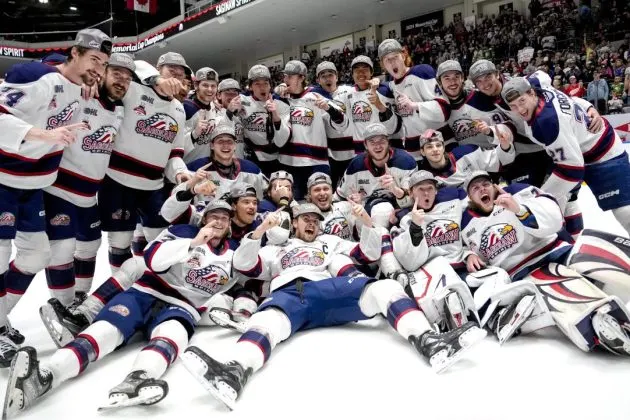I can't speak to the legal merits of the NCAA hockey lawsuit, but what I can tell you is that from the perspective of attracting the best players, the NCAA "boycotting" CHL players only harms the NCAA. https://t.co/8i4XNgofP6 pic.twitter.com/XKkuaZ6fsb
— Chuck Nisga (@chucknisga) August 14, 2024
The antitrust theory in Masterton v. NCAA is similar to the one used in O’Bannon, Alston, House, and other lawsuits challenging amateurism rules. Masterson argues that the NCAA and its member schools, functioning as competing businesses, have conspired to restrict how they compete for athletes. This, in turn, causes financial and professional harm to the athletes when potential competitors agree not to compete or to compete less aggressively than the market would otherwise incentivize.
The NCAA rule that disqualifies a hockey player who has played a CHL game is described as preventing "competition between the CHL and NCAA for top-end players." This is claimed to result in a suppression of compensation for those players and puts 16-year-olds in the challenging position of deciding, at a young age, whether they will ever want to play Division I hockey. Fans and consumers also experience a form of harm, as D-I hockey would be improved if CHL players could participate in it.
Masterson is represented by Richard A. Lafont and other attorneys from two law firms, Freedman Normand Friedland LLP and Berger Montague PC. The case has been assigned to U.S. District Judge Lawrence J. Vilardo, whose courtroom is in the Robert H. Jackson United States Courthouse in Buffalo, N.Y.
New: Canadian junior hockey player Rylan Masterson has filed a proposed class-action lawsuit against the NCAA and 10 universities alleging they are violating antitrust laws by preventing anyone who has played a game for a major-junior team from playing NCAA hockey.
— Rick Westhead (@rwesthead) August 13, 2024
Masterson, 19,… pic.twitter.com/meKOJqwO7r
Masterson is seeking to have his lawsuit certified as a class action on behalf of all individuals who played in the CHL from Aug. 12, 2020, to the present, or who attended college between the same dates after playing in the CHL. The CHL comprises 60 teams in three leagues (OHL, QMJHL, and WHL), so if the class is certified, it would include thousands of players. Masterson is seeking a court order to prohibit the NCAA from enforcing the rule and is also requesting monetary damages, which could be tripled under antitrust law.
The compensation of CHL players is crucial to the case because it determines whether these players are considered "professional athletes." Masterson emphasizes that CHL players do not receive a salary, but rather a stipend intended to cover living expenses, not as payment for labor, NIL, or other compensatory purposes. This stipend does not exceed $600 per month and is classified as an expense allowance rather than income for tax purposes.
Masterson points out that the CHL and D-I hockey teams are the main sources for players to pursue a hockey career and that over 50% of NHL players have played in the CHL, while about 30% have played in D-I hockey. He also notes that the United States Hockey League, another junior league, is considered to have a lower quality of play compared to the CHL, and is seen as a feeder for D-I.
Masterson’s complaint argues that the NCAA's prohibition on CHL players is senseless because the NCAA permits other professional hockey players to participate. The complaint mentions BU defenseman Tom Willander, who was selected 11th overall by the Vancouver Canucks in the 2023 NHL Draft. Before joining the Terriers, Willander played professional hockey in Sweden.
The complaint also points out that USHL players, who are eligible for the NCAA, receive similar stipends to CHL players. Furthermore, it notes that the NCAA allows athletes in other sports to receive significant compensation without forfeiting their NCAA eligibility. For instance, tennis players can earn up to $10,000 a year without losing their eligibility. Additionally, NCAA athletes like swimmers Katie Ledecky and Joseph Schooling earned hundreds of thousands of dollars while maintaining their eligibility.
Masterson alleges that the NCAA has considered lifting the ban but has not done so. He mentions that in May, NCAA coaches gathered for their annual meeting in Florida and discussed the legal concerns regarding the boycott but chose not to vote it out.
The NCAA will respond to the complaint and seek its dismissal. It is expected to argue that the rule promotes amateurism goals by distinguishing college athletes, who are also students, from professional athletes. However, this argument has not been successful in recent NCAA cases and seems particularly vulnerable to criticism in this case.
“The boycott of CHL players makes little sense given the substantial NIL money earned by current college athletes, and the NCAA eligibility of players who have played professional hockey outside North America,” attorney and retired hockey player Jonathan Calla said in a phone interview.
In 1994-95, Calla tallied 103 points for the Cowichan Valley Capitals in the British Columbia Hockey League before the forward joined Northeastern University, where he continued his hockey career and education. He’s now a director at Goulston & Storrs in Boston and serves as outside general counsel for Winners Alliance, a global athlete-centric commercial solution to group licensing, and the Professional Women’s Hockey League.
Calla stressed the importance of providing optionality to young players and their families.
“Historically, elite teenage hockey players and their families have faced a decision resulting in, if the CHL is chosen, the forfeiture of the opportunity to earn a college scholarship and play D-I hockey at an NCAA school. Given the changes in college sports, a player for the OHL’s London Knights should be able to continue his hockey path at Boston University.”
Calla also believes removing the boycott would mean D-I hockey could feature better players.
“NCAA hockey will be more competitive with a greater pool of players to draw from, helping all players within NCAA hockey become NHL ready.
Visit our site at 12ozsports.com

Comments
Post a Comment